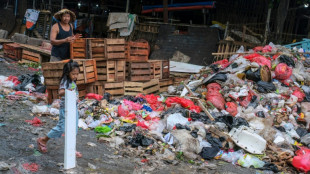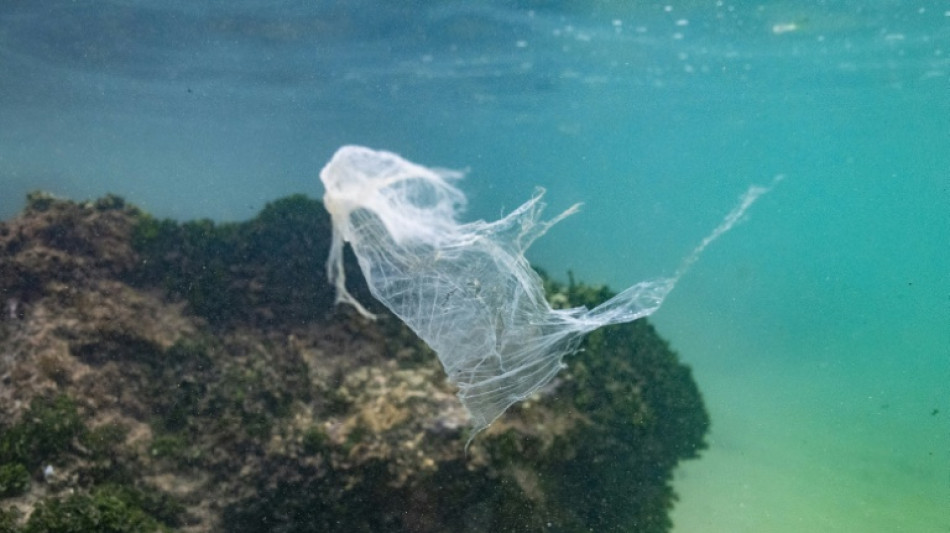
-
 Arteta tells faltering leaders Arsenal to harness Wolves 'pain' against Spurs
Arteta tells faltering leaders Arsenal to harness Wolves 'pain' against Spurs
-
Crowley gets nod for Irish as Prendergast drops out

-
 Unbeaten Swiss to meet Great Britain in Olympic men's curling semis
Unbeaten Swiss to meet Great Britain in Olympic men's curling semis
-
UK police arrest ex-prince Andrew on suspicion of misconduct

-
 Oil extends gains on US-Iran tensions, Europe stocks slide
Oil extends gains on US-Iran tensions, Europe stocks slide
-
Former prince Andrew, a historic downfall

-
 Sri Lanka post 178-7 against Zimbabwe ahead of T20 Super Eights
Sri Lanka post 178-7 against Zimbabwe ahead of T20 Super Eights
-
OpenAI's Altman tells leaders regulation 'urgently' needed

-
 US renews threat to leave IEA
US renews threat to leave IEA
-
Liverpool boss Slot says Isak in 'final stages of rehab'

-
 Airbus ready to build two new European fighter jets if 'customers' ask
Airbus ready to build two new European fighter jets if 'customers' ask
-
UN Sudan probe finds 'hallmarks of genocide' in El-Fasher

-
 Costelow starts, Hamer-Webb makes Wales debut in Six Nations clash with Scotland
Costelow starts, Hamer-Webb makes Wales debut in Six Nations clash with Scotland
-
Facing US warnings, Iran defends right to nuclear enrichment

-
 Ex-South Korea leader Yoon gets life in prison for insurrection
Ex-South Korea leader Yoon gets life in prison for insurrection
-
OpenAI's Altman says at India summit regulation 'urgently' needed

-
 British couple held in Iran sentenced to 10 years
British couple held in Iran sentenced to 10 years
-
West Indies ease past Italy to tune up for T20 Super Eights

-
 At least 16 killed after building collapses in Pakistan following blast
At least 16 killed after building collapses in Pakistan following blast
-
Summit photo op fails to unite AI startup rivals

-
 OpenAI's Altman says world 'urgently' needs AI regulation
OpenAI's Altman says world 'urgently' needs AI regulation
-
Horror comics boom in our age of anxiety

-
 Turkey fires up coal pollution even as it hosts COP31
Turkey fires up coal pollution even as it hosts COP31
-
London fashion week opens with tribute to one of its greats

-
 Ex-S.Korea leader Yoon gets life in prison for insurrection
Ex-S.Korea leader Yoon gets life in prison for insurrection
-
Pea soup, veggie mash contest warms up Dutch winter

-
 South Korea's Yoon: from rising star to jailed ex-president
South Korea's Yoon: from rising star to jailed ex-president
-
Private companies seek to import fuel amid Cuban energy crisis

-
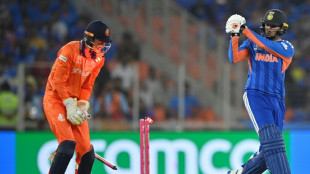 India search for 'perfect game' as South Africa loom in Super Eights
India search for 'perfect game' as South Africa loom in Super Eights
-
India's Modi calls for inclusive tech at AI summit

-
 Airbus planning record commercial aircraft deliveries in 2026
Airbus planning record commercial aircraft deliveries in 2026
-
Elections under fire: Colombia endures deadliest campaign in decades

-
 Traore backs 'hungry' Italy against France in Six Nations
Traore backs 'hungry' Italy against France in Six Nations
-
All-rounder Curran brings stuttering England to life at the death

-
 South Korea court weighs death sentence for ex-president Yoon
South Korea court weighs death sentence for ex-president Yoon
-
Tech chiefs address India AI summit as Gates cancels

-
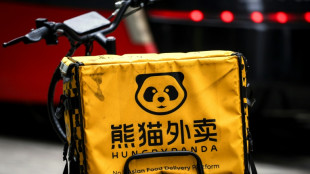 Australia rejects foreign threats after claim of China interference
Australia rejects foreign threats after claim of China interference
-
Somali militias terrorise locals after driving out Al-Qaeda

-
 Peru picks Balcazar as interim president, eighth leader in a decade
Peru picks Balcazar as interim president, eighth leader in a decade
-
Australian defence firm helps Ukraine zap Russian drones

-
 General strike to protest Milei's labor reforms starts in Argentina
General strike to protest Milei's labor reforms starts in Argentina
-
Cuban opposition figure Ferrer supports Maduro-like US operation for Cuba

-
 High-stakes showdown in Nepal's post-uprising polls
High-stakes showdown in Nepal's post-uprising polls
-
Asian markets rally after Wall St tech-led gains
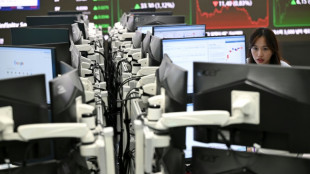
-
 After Greenland, Arctic island Svalbard wary of great powers
After Greenland, Arctic island Svalbard wary of great powers
-
Veteran Slipper set for new Super Rugby landmark

-
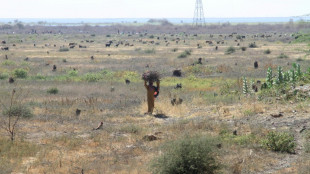 Sudan's historic acacia forest devastated as war fuels logging
Sudan's historic acacia forest devastated as war fuels logging
-
Deadly Indonesia floods force a deforestation reckoning

-
 Australia vow to entertain in bid for Women's Asian Cup glory
Australia vow to entertain in bid for Women's Asian Cup glory
-
Afghan barbers under pressure as morality police take on short beards


New research measures how much plastic is lethal for marine life
Marine animals inevitably eat what we toss in the ocean, including pervasive plastics -- but how much is too much?
The bar is low, according to a new study out Monday: less than three sugar cubes worth could kill birds like Atlantic puffins, for example.
That threshold "is much smaller than we expected," said Erin Murphy, ocean plastics researcher at the Ocean Conservancy, the nonprofit behind the study.
The paper published by The Proceedings of the National Academy of Sciences saw researchers analyze necropsies from more than 10,000 animals in a bid to model how different types of plastic can affect marine life, and at what point the dose turns lethal.
"The science is clear," Murphy told AFP. "We do need to reduce the amount of plastics we produce. We need to improve collection and recycling, and we need to clean up what's already out there."
Scientists pulled the necropsy results from dozens of studies and other databases across the globe, using data in which cause of death and plastic consumption information was known. The animals generally were stranded on beaches or otherwise incidentally caught.
Researchers modeled the relationship between plastics ingested and likelihood of death, according to total pieces consumed as well as the volume eaten relative to the size of the animal's digestive tract.
They also examined how different types of plastic affect different types of animals. Seabirds, for instance, were particularly impacted by rubber and hard plastics.
Just six pieces, each smaller than a pea, were 90 percent likely to cause death in those birds, according to the study.
Sea turtles faced considerable risk from soft plastics like bags.
Those items were also especially deadly for marine mammals, as was fishing gear.
"One whale actually contained, like, a three-gallon bucket," Murphy said.
Half of the individual animals were from species listed as threatened, vulnerable or endangered.
- 'Existential threat' of plastic -
Study authors hope their work can contribute to improving or creating monitoring programs to curtail plastic pollution.
The research "helps us understand materials that might be particularly dangerous that we may want to address through policy," Murphy said, pointing to balloons or plastic bags.
The study centered on deaths that occurred swiftly after injury to the GI tract, which is just one piece of a broader problem.
It's one piece of a broader problem: the research did not include chronic effects of plastic chemicals or risks of getting tangled, which are also serious hazards.
"Plastic pollution poses an existential threat to ocean wildlife, and this is an underestimate of that overall threat," Murphy said.
Kara Lavender-Law, an oceanography professor at the Sea Education Association, called the study "remarkable" and "a really systematic, careful look at the data that exists" to better understand and predict risk.
In 2019, six million tonnes of plastic entered rivers, lakes and oceans, according to the OECD.
In recent years much attention has turned to the ubiquity of microplastics, which have been found in the deepest ocean trench and scattered throughout the human body.
This study is a reminder that the issue of plastics seeping into the environment remains multi-pronged, Lavender-Law told AFP.
The shift of concern to micro- and nanoplastics, and from wildlife to humans, is reasonable, she said, "but it doesn't mean that the risks of the larger debris to larger animals isn't still a real problem."
S.F.Warren--AMWN


